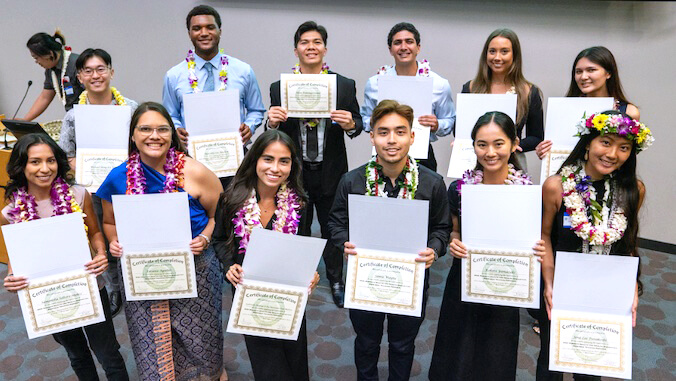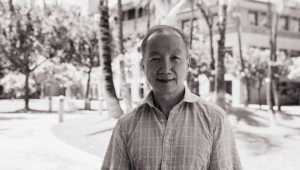
Decades of support for underrepresented students in Hawaiʻi and the Pacific has been shut down due to federal budget cuts. Two student research programs run by the University of Hawaiʻi at Mānoa’s John A. Burns School of Medicine (JABSOM) have been ended by the National Institutes of Health (NIH).
If the decision stands, we’ll feel the void in five to 10 years—in our classrooms, our clinics and our communities
—Angela Sy
The unexpected termination of the Pacific Short-Term Research Experience Program to Unlock Potential (STEP-UP) and the Minority Health Research Training (MHRT) Program is anticipated to have lasting effects on local students and the state’s ability to grow its own biomedical workforce.
Pathways cut short
Pacific STEP-UP, a high school research pathway program active since 2002, has served more than 445 students directly and hundreds more through laboratory education. Its director, George Hui, explained that the program trained underserved students, often from rural or isolated communities in the Pacific, to conduct research relevant to their communities.
“From studying taro farming in the presence of global warming and sea level rising, to investigating pollution in the Marshall Islands, students tackled real-world, locally rooted problems,” Hui said.

NIH recently and unexpectedly ended funding for the program. “They said we were engaged in DEI activities that are not aligned with the current administration,” Hui said.
The cut came despite Pacific STEP-UP changing its eligibility rules in March 2024 to include everyone in the Pacific, removing race, ethnicity or sex as criteria for application reviews or funding decisions.
“We were confident we wouldn’t be affected,” Hui said. “We adjusted a year ago. And we had more applications than ever, over 500 this cycle. Now, we’re telling kids they can’t participate. There’s no time, no backup plan, and no comparable alternative.”
Over the last two decades, Pacific STEP-UP was a proven success with students launching successful careers in STEM. Most recently, Nichelle Torcelino from Guam was accepted to Yale, Columbia, and the University of Pennsylvania. Others from American Samoa have gone to Harvard and claim advanced degrees in public health.
Programs offered more than research experience
“We don’t just give our students lab time,” Hui added. &dquo;We help them believe they belong in science and research. Without programs like this, that path disappears for many.”

The MHRT program, launched in 2013 by Vivek Nerurkar, and now led by Angela Sy, both from the Department of Tropical Medicine, Medical Microbiology and Pharmacology, sent underrepresented undergraduate and graduate students to conduct mentored research in places such as Thailand, India, American Samoa, Guam, Cameroon and Liberia.
“These students often had never traveled beyond the state. They return transformed—not just as budding scientists, but as global citizens,” said Sy.
More than 123 students participated, with 66% pursuing graduate degrees and many now working in medicine, research, and academia.
Sakaria Laisene Auelua-Toomey a MHRT 2015 alumni who graduated from UH Mānoa in 2016 earned a PhD in psychology from Stanford University in 2024 and is now a faculty at UH Mānoa.
Impact on Hawaiʻi’s research future
Program leaders say the cuts hurt Hawaiʻi’s ability to build a local workforce. “These are resource-limited areas,” Hui said. “Without exposure to science, there’s no pipeline.”
JABSOM officials are hoping for a legal reprieve. The termination is being challenged as part of a multistate lawsuit against NIH’s rollback of DEI programs.
“If the decision stands, we’ll feel the void in five to 10 years—in our classrooms, our clinics and our communities,” said Sy.

